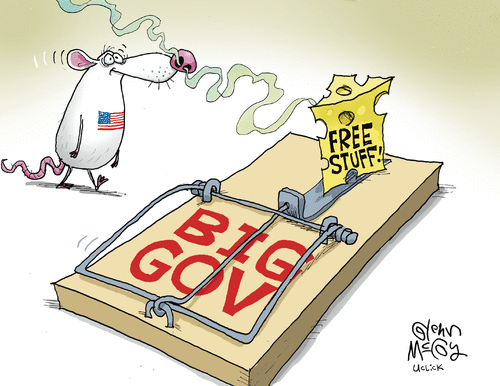QUOTE OF THE DAY
Fast Company: America’s digital divide: Startups fly, storefronts struggle
When 30-year-old Chicago native Sheyla Jarocz talks about how a brick and mortar storefront survives in the city’s North Center neighborhood, it sounds like a lonely mission. “I’ve tried to do promotions with nearby businesses,” said Jarocz, who opened Maash Boutique two years ago. “They’ve said, ‘You have to figure it out on your own.’”
Meanwhile Anton German, a Russian-born tech entrepreneur, describes a Chicago that’s warm and collaborative. “What helps is the number of incubators and co-working spaces that allow entrepreneurs to flourish.” Seven years ago, a 22-year-old German started BayRu, an eBay-like platform for Russian customers, and he had to bootstrap his company before getting angel investors. “Getting any funding was impossible,” German said. “Right now, I’d say it’s the reverse. Some would say it’s a bubble.”
The divide you see in Chicago exists nationwide: At a time where the stories of startups surround us, American entrepreneurialism is actually on a decades-old downward trajectory. Fewer start up and more fall down: The failure rate for new businesses has increased in the last 20 years and more people are working for established firms, according to a recent Brookings Institution report. A recent Fed study shows that business ownership rates among American families are at a 25-year low. The U.S. Census bureau is reporting that for the first time in three decades,business deaths outnumber business births.
Crain’s: New tax-dodge rules prompt AbbVie to seek more Shire financing: sources
AbbVie Inc. is examining plans to raise additional financing to complete its takeover of Shire Plc, after U.S. officials imposed new obstacles to so-called tax inversion deals, people with knowledge of the matter said.
AbbVie may seek to borrow as much as $7 billion more than it originally anticipated because of new restrictions on using cash held offshore, two of the people said, asking not to be identified discussing a private matter. The deliberations are at an early stage, and are part of a comprehensive review of the Shire transaction’s structure after U.S. Treasury Secretary Jack Lew announced measures to make inversions more difficult this week, the people said.
President Barack Obama’s administration is looking at ways to halt a wave of acquisitions that allow U.S. companies to move their legal address overseas, potentially eroding the corporate tax base. The rules imposed this week, which Lew said are within the powers of the executive branch to enact without Congressional legislation, will make it more difficult for U.S. companies to finance inversion deals by using cash they hold overseas, beyond the reach of American taxes. While offshore money can still be used under the new regulations, it would be subject to a 35 percent tax rate.
Belleville News Democrat: Illinois needs to slim down
It’s not surprising that a state that has more than 8,400 units of government, the most in America, would have other excesses that cost the taxpayers money.
Comptroller Judy Baar Topinka pointed out two additional categories that need consolidating during a visit to the BND this week:
* Illinois has 900 separate financial accounts in addition to its general fund. By comparison, Wisconsin has 60.
Bloomberg: Largest Public Pensions Face $2 Trillion Hole, Moody’s Says
The 25 largest U.S. public pensions face about $2 trillion in unfunded liabilities, showing that investment returns can’t keep up with ballooning obligations, according to Moody’s Investors Service.
The 25 biggest systems by assets averaged a 7.45 percent return from 2004 to 2013, close to the expected 7.65 percent rate, Moody’s said in a report released today. Yet the New York-based credit rater’s calculation of liabilities tripled in the eight years through 2012, according to the report.
“Despite the robust investment returns since 2004, annual growth in unfunded pension liabilities has outstripped these returns,” Moody’s said. “This growth is due to inadequate pension contributions, stemming from a variety of actuarial and funding practices, as well as the sheer growth of pension liabilities as benefit accruals accelerate with the passage of time, salary increases and additional years of service.”
STL Today: Illinois to spend $27 million on southern highway fixes
Illinois will spend nearly $27 million on improvements to a highway in some of the state’s southern counties.
The construction project on the north-south Route 45 is part of a state jobs program that aims to reduce unemployment and upgrade old infrastructure throughout the state, WSIL-TV reported.
Work will include widening part of the highway to four lanes in Saline County from Route 142 to Texas City Road. Crews will also patch and resurface a 4-mile stretch of highway in Williamson county between Stonefort and Route 166.
Chicago Tribune: The campaign to keep Karen Lewis out of the mayoral race
OUt of nowhere nearly two weeks ago, Democrats for Education Reform, a pro-charter schools organization backing Mayor Rahm Emanuel’s re-election, issued a news release demanding that Chicago Teachers Union President Karen Lewis step down from her job if she decides to challenge Emanuel in February’s election.
The demand was premature, in that Lewis hasn’t yet officially declared her candidacy. And it was baseless, in that it contended that candidate Lewis would have a “conflict of interest” with union-boss Lewis, who will be leading CTU negotiators attempting to hammer out a new teachers contract in the coming months.
“Chicagoans won’t know whether President Lewis is representing her members, her political interests, or if she’s (using) the negotiations merely as an extension of her campaign,” said the release, quoting DFER-Illinois State Director Rebeca Nieves-Huffman.
Chicago Tribune: CPS: Enrollment numbers won’t lead to school budget cuts
In the second year of a divisive per-pupil funding formula, Chicago Public Schools officials are again telling principals their school budgets won’t be cut even if the school’s enrollment fails to meet projections.
In letters to principals, CPS chief Barbara Byrd-Bennett said “transition contingency funds” from the Student-Based Budgeting policy and an “anticipated surplus from Tax Increment Financing funds” will be used to ensure no schools see a drop in funding this year under the per-pupil formula. Schools with enrollments that exceed projections, however, will be awarded a corresponding increase in funding, Byrd-Bennett said. The district made a similar concession last year.
The district will take two additional enrollment counts in October, the district CEO said, and schools will be eligible to receive additional funding if enrollment has increased by 10 or more students on those dates.
CARTOON OF THE DAY

